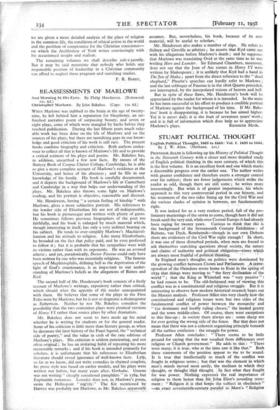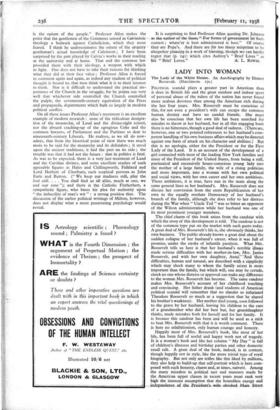STUART POLITICAL THOUGHT
English Political Thought, 1603 to 1660 Vol. I. 1693 to 1644. By J. W. Allen. (Methuen. 2
PROFESSOR EN is following up his History of Political Thought in the Sixteenth Century with a closer and more detailed study of English political thinking in the next century, of which this is the first volume. It is an excellent book and one which marks a discernible progress over the earlier one. The author writes with greater confidence and therefore exerts a stronger control over his subject; there are fewer judgements which strike the reader as odd, though there are still some ; he writes more interestingly. But what is of greatei importance, his whole approach to this very controversial period in our history, and his treatment of the two sides lining up for the Civil War and the various shades of opinion in between, are fundamentally right. '
It was indeed for us a very restless period, full of the pre- liminary mutterings of the storm to come, thoughhere it did not break until the very end, while over Central Europe it had already been raging for twenty years. Curious to think that this is the background of the Seventeenth Century Exhibition : of Rubens, van Dyck, Rembrandt—though in our own Dobson there are evidences of the Civil War right 'enough ! In short, it was one of those disturbed periods, when men are forced to ask themselves searching questions about society, the nature and claims of authority and political obligation—times whiqi are always most fruitful of political thinking. - ' -
In England men's thoughts on politics were dominated by the growing conflict between Crown and Parliament Acrirre- spondent of the Oxindens wrote home to Kent in the spring of 1639 that things were moving to " the fiery declinaticin of the world " ; that the King at Whitehall was " very pensive " : he had reason to be. The old-fashioned. ,way of viewing this conflict was as a Constitutional and religious struggle. Bin it is interesting to observe how modern historical research bears out the Marxist analysis. • Profesior -Alleniees very clearly how the constitutional and religious issues were but two sides of the fundamental conflict of power between the monarchy and " the dominant and locally ruling classes," the landed gentry and the town iniddlelclass. Of course, there were exceptions to this line-up ; in society there always are : some sheep are for ever getting the wrong side of the fence. But that does not mean that there was not a coherent organising principle beneath all the surface confusion : the struggle for power.
Professor Allen concludes : " There seems to be little ground for saying that the war resulted from differences over religion or Church government." He adds to this : " There were many, it is true, who at the time saw it like that." Both these statements of the :position appear to ire to be sound. It is true that intellectually so much of the conflict was fought in religious terms ; but that-was the eleineiit in which men's minds moved most easily, the medium in which they thought, or thOug-ht :their thought. In fact what they fought for was power. Nothing expreisei the real importance of religion to them better than Sir John Eliot's revealing state- ment : " Religion iti is that keeps the subject in obedience art exact .seventeenth-century.parallel to Mares- 4". Religion
is the opium of the people." Professor Allen makes the point that the gentlemen of the Commons sensed in Calvinistic theology a bulwark against catholicism, which they most feared. I think he underestimates the extent 'of the optintry gentleman's actual knowledge of Calvinism ; I have been surprised by the part played by Calvin's works in their reading at the university and at home. That and the common law provided them with their ideology, a weapon with which to fight. One does not have to take their reasons for thinking what they did at their face value ; Professor Allen is forced to comment again and again, as indeed any student of political thought is bound to, that men think what it is to their interest to think. Nor is it difficult to understand the practical im- portance of the Church in the struggle, for he points out very well that whichever side controlled the Church controlled the pulpit, the seventeenth-century equivalent of the Press and propaganda, departments which bulk so largely in modern political conflict.
On all these issues Professor Allen's treatment is an excellent example of modern research : none of the ridiculous denigra- tion of the monarchy, of Laud and the divine-right school, nor the absurd cracking-up of the egregious Coke and the common lawyers, of Parliament and the Puritans so dear to nineteenth-century Liberals. He realises, as we all do now- adays, that from the historical point of view there was much more to be said for the monarchy and its defenders ; it stood upon the ancient traditions, it had the past on its side ; the trouble was that it had not the future : that in politics is fatal. As was to be expected, there is a very just treatment of Laud and the Caroline divines, and some excellent studies of such agreeable figures as Hales and Chillingworth, Falkland and Lord Herbert of Cherbury, such sceptical persons as John Earle and Burton. (" We keep our madness still, play the fool still. . . . You shall find us all alike, much at one, we and our sons "); and there is the Catholic Fitzherbert, a sympathetic figure, who bases his plea for authority upon " the imbecility of man's wit " : a strong position that. The discussion of the earlier political writings of Milton, however, does not display what a more penetrating psychology would reveal.
•
It is surprising to find Professor Allen quoting Dr. Johnson
- asthe. author-of the 4ineerft-For "forms-of- government let fools contest ; whate'er is best administered is best." Of course they are Pope's. And there are far too riiany misprints to' be altogether pleasing-in a work of learning; thotigh we- can hardly regret that (p. 241) which cites Aubrey's " Brief Lives "_ as



















































 Previous page
Previous page